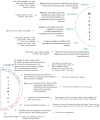In Pursuit of Healthy Aging: Effects of Nutrition on Brain Function
- PMID: 34068525
- PMCID: PMC8126018
- DOI: 10.3390/ijms22095026
In Pursuit of Healthy Aging: Effects of Nutrition on Brain Function
Abstract
Consuming a balanced, nutritious diet is important for maintaining health, especially as individuals age. Several studies suggest that consuming a diet rich in antioxidants and anti-inflammatory components such as those found in fruits, nuts, vegetables, and fish may reduce age-related cognitive decline and the risk of developing various neurodegenerative diseases. Numerous studies have been published over the last decade focusing on nutrition and how this impacts health. The main objective of the current article is to review the data linking the role of diet and nutrition with aging and age-related cognitive decline. Specifically, we discuss the roles of micronutrients and macronutrients and provide an overview of how the gut microbiota-gut-brain axis and nutrition impact brain function in general and cognitive processes in particular during aging. We propose that dietary interventions designed to optimize the levels of macro and micronutrients and maximize the functioning of the microbiota-gut-brain axis can be of therapeutic value for improving cognitive functioning, particularly during aging.
Keywords: aging; cognition; macronutrients; microbiota-gut-brain axis; micronutrients; neurodegeneration; nutrition.
Conflict of interest statement
The authors declare no conflict of interest.
Figures



Similar articles
-
Role of fruits, nuts, and vegetables in maintaining cognitive health.Exp Gerontol. 2017 Aug;94:24-28. doi: 10.1016/j.exger.2016.12.014. Epub 2016 Dec 21. Exp Gerontol. 2017. PMID: 28011241
-
Nutritional strategies for successful aging.Med Clin North Am. 2011 May;95(3):477-93, ix-x. doi: 10.1016/j.mcna.2011.02.009. Med Clin North Am. 2011. PMID: 21549873 Review.
-
Perspective: Neuroregenerative Nutrition.Adv Nutr. 2017 Jul 14;8(4):546-557. doi: 10.3945/an.117.015388. Print 2017 Jul. Adv Nutr. 2017. PMID: 28710142 Free PMC article.
-
An Anti-Inflammatory Diet and Its Potential Benefit for Individuals with Mental Disorders and Neurodegenerative Diseases-A Narrative Review.Nutrients. 2024 Aug 10;16(16):2646. doi: 10.3390/nu16162646. Nutrients. 2024. PMID: 39203783 Free PMC article. Review.
-
Influence of human gut microbiome on the healthy and the neurodegenerative aging.Exp Gerontol. 2024 Sep;194:112497. doi: 10.1016/j.exger.2024.112497. Epub 2024 Jun 27. Exp Gerontol. 2024. PMID: 38909763 Review.
Cited by
-
Nutritional interventions to support acute mTBI recovery.Front Nutr. 2022 Oct 14;9:977728. doi: 10.3389/fnut.2022.977728. eCollection 2022. Front Nutr. 2022. PMID: 36313085 Free PMC article.
-
Impact of Gut Microbiota in Brain Ageing: Polyphenols as Beneficial Modulators.Antioxidants (Basel). 2023 Mar 26;12(4):812. doi: 10.3390/antiox12040812. Antioxidants (Basel). 2023. PMID: 37107187 Free PMC article. Review.
-
Association Between Dietary Patterns and Cognitive Function in Midlife Adults: The Bogalusa Heart Study.Nutrients. 2025 May 10;17(10):1636. doi: 10.3390/nu17101636. Nutrients. 2025. PMID: 40431376 Free PMC article.
-
Animal-derived foods, physical activities, and mild cognitive impairment among Chinese older adults: findings from CLHLS (2008-2018).BMC Public Health. 2025 Jun 4;25(1):2088. doi: 10.1186/s12889-025-23382-z. BMC Public Health. 2025. PMID: 40468289 Free PMC article.
-
Cognitive impairment and the gut-brain axis during 2014-2023: a bibliometric analysis.Front Neurol. 2024 Jul 5;15:1407956. doi: 10.3389/fneur.2024.1407956. eCollection 2024. Front Neurol. 2024. PMID: 39036641 Free PMC article.
References
-
- FAO. IFAD. UNICEF. WFP. WHO . The State of Food Security and Nutrition in the World 2020. FAO; IFAD; UNICEF; WFP; WHO; Rome, Italy: 2020. - DOI
Publication types
MeSH terms
Substances
LinkOut - more resources
Full Text Sources
Medical

